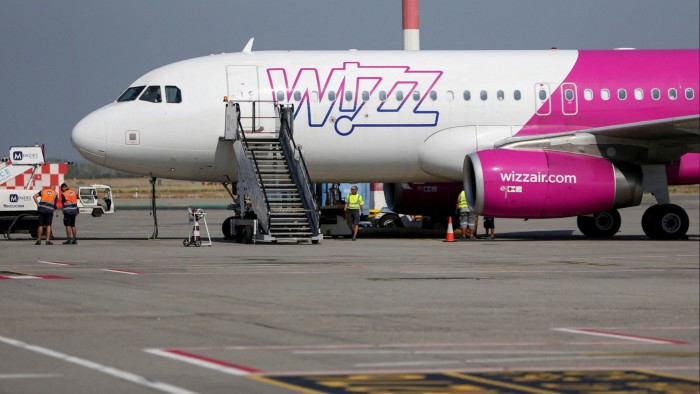Unlock the Editor’s Digest for free
Roula Khalaf, Editor of the FT, selects her favourite stories in this weekly newsletter.
Wizz Air’s profits fell by more than 40 per cent last year as the low-cost carrier grappled with the grounding of its planes owing to engine problems, sending shares down 26 per cent on Thursday.
The London-listed airline said net profit for the year to the end of March slumped 41.5 per cent year on year to €213.9mn, as it was hit with higher costs and capacity constraints resulting from more than 40 of its aircraft being out of action.
The airline said costs for maintenance, materials and repairs rose by almost 16 per cent, as it was forced to hire spare planes to fill gaps in its fleet and extend the life of older aircraft. That increase weighed on its earnings despite record passenger numbers of 63.4mn, and a fall in fuel costs over the year.
Problems with Pratt & Whitney engines have limited Wizz Air’s growth plans since the RTX-owned engine maker began recalls of its engines for inspections in 2023, owing to concerns over contaminants in the powdered metal used to make its turbofan engines.
Wizz Air has been the worst-hit airline in Europe, issuing two profit warnings in the last financial year. It reported a 3.8 per cent rise in revenue over the full year to €5.3bn.
József Váradi, Wizz chief executive, said the carrier had delivered a second consecutive year of profitability in spite of its issues, adding that the group had been operating under “unique circumstances”.
The engine issues, however, had made a “profound impact” on the carrier’s “cost performance,” he said.
The airline has agreed a new compensation package with Pratt & Whitney, having received undisclosed compensation for the loss of aircraft from the engine maker last summer. The package covers Wizz’s direct costs associated with aircraft that have been grounded and those expected to be.
Wizz said 42 aircraft were grounded at the end of March and it expected to have about 34 planes on the ground by the end of the first half of its 2026 financial year.
Váradi said the carrier was withholding guidance for the year owing to the unpredictability around the “engine recovery” issue and geopolitical uncertainties.
He expected another two to three years of disruption and said that by 2027, “most of the aircraft will be recovered and flying”.
“2027 will be the turning year,” he added, noting that despite the turbulence “we are still standing”.
Read the full article here













